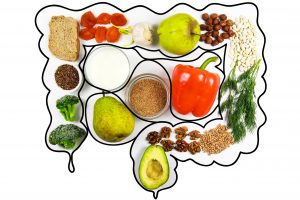4 Ways to Keep your GI Tract Running Smoothly

Do you have stomach discomfort or pain more than you’d like? (Here’s a tip: It shouldn’t be hurting at all!) If you’re having some issues with your digestive system, know that you don’t have to suffer.
Our doctors can help you diagnose and treat any issues, and help you keep your GI tract running smoothly. Here are some of our top tips that will help lead you on the path to feeling better.
1. Get a colonoscopy by age 45
A colonoscopy is the trifecta of gastrointestinal tract examination tools. Your doctor can: See what’s going on in your intestines; remove certain polyps during the procedure; and diagnose issues in your GI tract (including colon cancer).
Every single person should have a colonoscopy by age 45 (or sooner, if you have other risk factors), for many reasons. If you experience digestive pain, a colonoscopy can evaluate possible GI causes that can be contributing to discomfort – including polyps, colon cancer, diverticulosis, inflammatory bowel disease, bleeding, change in bowel habits, obstruction, and more.
And knowing the cause is half the battle – because then it can be treated.
2. Add more fiber in your diet
As we get older, our bodies often need to work harder for things that never used to seem as difficult. One of the ways it becomes obvious is in our digestive tract. What goes in must come out, but you may notice that process can become more challenging – often because of a lack of fiber.
This doesn’t mean you have to limit yourself to a diet of boring bran flakes and prunes to keep things running smoothly. Simple changes to your diet can help, including by incorporating more fiber in the food choices you make.
Most Americans don’t regularly eat a lot of fiber, so you’ll want to gradually increase your fiber intake if that’s the case. Otherwise, you may end up with more gas and bloating than you’re used to and decide to stop the fiber altogether (which you shouldn’t!).
Some simple ways to incorporate more fiber into your diet include:
- Swapping refined grains for whole grains when possible (in breads, cereals, popcorn, etc.)
- Adding in fruits and vegetables – like apples, broccoli, berries, avocados – before meals
- Read labels: When using processed foods, look for ones with higher fiber content
3. Drink More Water
So much of our health depends on our hydration, and that’s especially true when it comes to our digestive system. Water is vital to your GI tract because it breaks food down so that your body can absorb the nutrients better. But in addition, water helps you to be more comfortable because it helps digest fiber.
Think of the food going through your intestinal tract as a fallen branch going down a river. If the water levels are high, there are no problems and things can flow easily. But if the water levels are low, that stick going down the river is going to gather mud, get bigger and maybe get stuck.
Aim for eight 8 oz. glasses of water – plain or with fruit, but not carbonated – a day. A glass in the morning and following each meal gives you four glasses, so you’ll only need another 32 oz. of water throughout the day.
4. Talk to your doctor – even about the little things.
If you’ve always been told you have a “nervous stomach” or know that certain foods make your stomach not feel the greatest, it’s time to get to the root of the problem. Things don’t “just happen.” There’s a reason – and we can help you pinpoint the reason and treat it, so you can start feeling better! Questioning it? Check out these 5 Reasons You Need to See a GI Doctor.
There could be a growth or irritation in your gastrointestinal tract that, if diagnosed, can be taken care of so the issue isn’t something you have to “just deal with” anymore. Or, there could be a larger concern at hand that, once you know what it is, doctors can determine the best way to fix it – whether through medication, surgery, or another option.
Talk to your doctor. That’s what we’re here for!
Ask Gastrointestinal Specialists, P.C.
Our team of doctors at Gastrointestinal Specialists P.C., in Troy, Michigan have the knowledge and experience finding and treating diseases in the gastrointestinal tract to ease your stomach issues. And we’re committed to making your experience at our facility as comfortable and convenient as possible.
